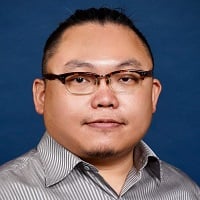 By Merin C. MacDonald
By Merin C. MacDonald
Meng-Ju Wu, PhD, is on a scientific journey. Guided by a curiosity sparked during his graduate training, Dr. Wu studies how changes in metabolism and epigenetic gene regulation can lead to tumor growth or immune evasion in cancer patients. His focus is on advancing our understanding of some of the most highly mutated metabolic genes in cancers such as intrahepatic cholangiocarcinoma and glioma, through in vivo tumor models and biomarker identification.
Dr. Wu, an assistant professor of medicine in the Division of Gastroenterology, is using mouse models, cellular immunology, and functional genomics, to reveal mechanisms that allow cancers to escape immune detection and develop new therapeutic strategies. During his postdoctoral studies at Harvard Medical School/Massachusetts General Hospital, his work concentrated on the biology of the isocitrate dehydrogenase 1 (IDH1) mutant intrahepatic cholangiocarcinoma, a cancer with one of the highest mortality rates. Dr. Wu generated novel mouse models of cholangiocarcinoma containing mutations in IDH1 in combination with various oncogene/tumor suppressor mutations found in human cancers. Using these models, he investigated the biological and molecular impact of IDH inhibition and found mechanisms that support IDH1 tumor growth.
Dr. Wu’s recent studies expanded on his previous work and have revealed a new pathway for anti-tumor immunity as a key mechanism underlying the anticancer effects of mutant IDH1 inhibition. In collaboration with Agios and Servier Pharmaceuticals, he contributed to work that led to FDA approval for TIBSOVO, a small target molecule therapeutic for advanced cholangiocarcinoma. “Diagnosis often comes at a later stage of cholangiocarcinoma and unfortunately, there is no cure,” said Dr. Wu. “With this therapy, tumors shrink in only 3-5% of patients, 56% of patients remain stable, and the rest do not respond. There is no cure, so even though the response rate is very low the FDA approved this drug.”
As he begins his career at UMass Chan, Dr. Wu will continue investigating new strategies to target the IDH1 mutation in cholangiocarcinoma. “The most important thing is to keep studying these mechanisms,” he said. “If we can find other strategies or combination therapies to help cure this kind of mutation it would be a breakthrough discovery. This mutation occurs not only in cholangiocarcinoma but other cancers too.” Dr. Wu’s primary project will focus on genome-wide or target-specific CRISPR screening to find vulnerability for mutant IDH1 cancers. He also aims to collaborate with clinicians to start to bring therapies to patients through clinical trials.
Dr. Wu joined the faculty at UMass Chan Medical School earlier this fall after completing a research fellowship in cancer biology and serving as an instructor at the Krantz Family Center for Cancer Research at Massachusetts General Hospital/Harvard Medical School. Additionally, he completed his PhD and postdoctoral training in cancer biology at Purdue University College of Veterinary Medicine. He has been the recipient of prestigious training awards including an American Cancer Society postdoctoral fellowship and a Special Collaboration Award given by the Cholangiocarcinoma Foundation. Before coming to the United States for his graduate and postgraduate studies, Dr. Wu began his scientific journey in his home country of Taiwan, where he studied life science and oral biology.
We are thrilled to welcome Dr. Wu to the Department of Medicine!
